'One Season Wonders' Review: "Freaks and Geeks" - Episode 1 - "Pilot" - What's your gigantic drum kit?

As explained in this post, I’m spending the next eighteen Wednesdays reviewing and analyzing a short-lived TV classic from 1999….Freaks and Geeks! Hailed by critics and fans as one of the greatest shows in the history of the television medium, this High School dramatic comedy launched the careers of Judd Apatow, Jason Segel, Seth Rogen, James Franco, along with many others, and if you’re unfamiliar with it, I can’t recommend it highly enough. If you’d still like to know more about the series, here’s a link to the extensive Wikipedia page.
If you’re already a fan, then you know why I’m reviewing this series. It’s incredible, and there’s lots to talk about. Continue reading after the jump for my review and analysis of the Pilot episode - I honestly think this is some of the best writing I've ever done, and I'm very proud of how these reviews are turning out. (And like all my TV reviews, I expect the reader has seen the episode in question, so if you haven’t, go track down the DVDs and return here when you’ve caught up. The review will be waiting pateintly for you.)
Spoilers for Freaks and Geeks, Episode 1 – “Pilot” – coming after the jump…
Network TV pilots suck.
This is a broad generalization, yes, but a fairly accurate one that must be understood if one wishes to study television for any length of time while retaining one’s sanity. Suck obviously isn’t the right word for all pilots, though many of them really are quite awful (and in any given development seasons, most pilots are so awful that they are never picked up to series). More accurately, most network TV pilots are vastly underwhelming, messy, sub-par, clunky, or dull. The typical reason a pilot underwhelms is because the creators have to sum up exactly what their ongoing show will be in 44 minutes or less so a group of network executives will understand the worth of the series, and this leads to episodes overstuffed with exposition, character introductions, etc., and if it’s a comedy, there isn’t usually any time left over for quality humor. Even if the pilot is genuinely good, it’s rare that it represents a fully formed vision of the series it’s introducing.
Freaks and Geeks, though? It doesn’t just have a good pilot. It has a great one that stands as a truly classic episode of television. It doesn’t just come fully formed in its first hour – it comes formed in the opening minutes.
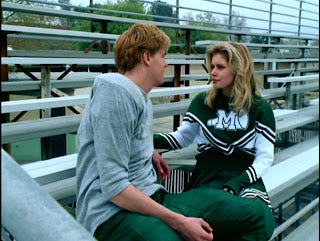
Indeed, the entire series opens with a humorous mission statement of sorts: we begin with a shot of the football field, conjuring images and memories of high school sports and jocks – you know, the “successful” and “popular” kids, the ones most series of this ilk would focus on. We pan over to the bleachers, where one such jock and his beautiful cheerleader girlfriend are making sappy, over-dramatic proclamations of romance. Are these our main characters, two popular teenagers desperately in love with one another? Before that thought can even be fully processed, the camera pans down. The soft sentimental music is violently replaced by the sounds of Van Halen’s “Running with the Devil” as we meet the people under the bleachers, the “Freaks,” the kids few high school shows are ever brave or talented enough to center a story around. That’s the mission statement. That abrupt pan beneath the bleachers is Freaks and Geeks boldly proclaiming that it’s not going to tell the same gooey teenage romance story so many other shows have tackled again and again. It’s going to be different.

That devilishly fun stylistic (and thematic) flourish hooked me right away, but the show’s opening camera shot isn’t even close to being over. As the camera settles on the kids under the bleachers, we meet the Freaks: Daniel Desario (James Franco), who seems to be in charge of things, or at least in command of everyone’s attention with a seemingly silly story about how his Church kicked him out for wearing an inappropriate shirt. Once you get to know Daniel, though, you’ll see that his story bears a lot more weight and meaning than anything the athletes sitting above have to say. Ken Miller (Seth Rogen) fulfills a function he will time and time again in the future, sitting back and commenting on what Daniel is saying with a hilariously dry wit. Nick Andopolis (Jason Segel), clearly a pothead, obsessed with drumming, and just happy to be there, in the moment.

The introductions aren’t done. The camera pans right, away from the bleachers, and we get a first glimpse of our main character, Lindsay Weir (Linda Cardellini), looking apprehensive and out of place. We’ll learn why later, and I’ll have plenty to say about her. For now, the camera isn’t done moving; it continues past the bleachers, introducing us to three Freshman Geeks, Sam Weir (John Francis Daley), Lindsay’s little brother, and his friends, the pop-culture-obsessed Neal Schweiber (Samm Levine) and hilariously awkward Bill Haverchuck (Martin Starr). Sam is the target of bully Alan, and narrowly escapes a beating thanks to Lindsay’s casually intimidating intervention (Alan, as we see throughout the pilot, is a fantastically weak and ineffective bully). As Alan, Sam, and the others all walk away, Lindsay is left alone to utter the last line before the theme song – “Man, I hate high school.”
And there you have it. That’s Freaks and Geeks. This one long take hasn’t just introduced us to nearly every major character, but also laid out the humorous yet brutally honest tone, and given a strong indication of what kinds of stories we’re going to see not just for the rest of the pilot, but over the course of the series. Freaks and Geeks may have been prematurely cancelled, but it made the absolute most of its brief time on the air; as evidenced by this one scene, creator Paul Feig and company clearly knew exactly what the show was and could articulate that vision perfectly from the opening moments.
The pilot introduces us to a fairly dense and layered world, full of different characters all with their own arcs and material worth talking about. If there’s one word I could use to describe the power of Freaks and Geeks, it would be honesty; every moment of the series feels like an accurate and poignant reflection of real teenage life, and as such, whichever character speaks most strongly to you will be largely determined by your own high school experiences.
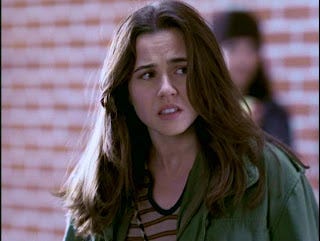
Me? I definitely connected with Lindsay right from the start. The particulars of my own high school story are wildly different, of course, but I can certainly relate to a smart teenager who has finally hit a wall with being good, honest, and studious. When the series opens, she’s already deep in the midst of an identity crisis; she’s stopped participating in the Academic Decathlon, has taken to wearing her father’s Army jacket, has abandoned her nerdy friend Millie for Daniel and the Freaks, and though she heatedly denies it when her Dad tells her a friend saw her smoking, I’m assuming Lindsay looks apprehensive the first time we see her because she’s just tried a cigarette for the first time (probably thanks to Daniel).
In short, Lindsay is straying from her sheltered, closed-off academic life to explore the vast, strange world that is being a rebellious teenager, and her journey into this heart of darkness is the key thematic and narrative arc of the series. In the pilot alone, we can tell it is going to be both a fascinating and heartbreaking one. Her first major step into teen culture comes midway through the episode, when she cuts class with Nick, and though it doesn’t exactly end well when she’s caught by her counselor, Mr. Rosso, her foray into truancy lasts long enough for Nick to show Lindsay his awesome, epic drum set; and, I think, give Freaks and Geeks its thesis statement:
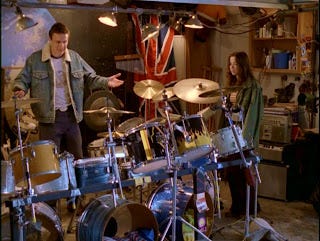
“Teachers want us to work, and I say, fine, I’ll work. But you’ve gotta let me do the kind of work that I wanna do. And for me, Lindsay, it’s, it’s my drum kit, man. This is my passion, you know? This is – this is the essence of who I am now. But before I had this, I was lost too. You see what I’m saying? You, you need to find your reason for, for living. You’ve gotta find your big, gigantic drum kit.”
Nick probably isn’t as confident and collected as he appears, but his speech still cuts straight to the core of Lindsay’s arc: she’s trying to discover who she really is, to craft an identity that makes her comfortable in her own skin. In short, she’s trying to discover what her gigantic drum set is, and that’s a journey every teenager has to take at one point or another. Lindsay is, in that regard, the perfect archetypical teenager, someone struggling to find their place in the world, and since she’s stuck in the middle, she has a multitude of options open to her. That’s why I relate so strongly to her, and I suspect most fans of Freaks and Geeks will agree they see some of Lindsay in themselves.
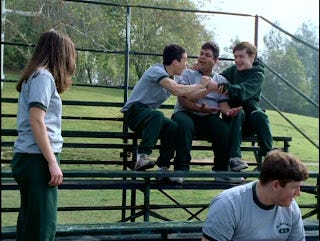
But Lindsay is so much more than a blank slate for the audience to project onto – she’s a wonderful, fully formed character in her own right, evidenced most strongly by her interactions with Eli, the sweet mentally-disabled boy. Eli is one of those characters I instantly recognized from my own High School days, and that made the scene where Lindsay attempts to defend him from the bullies on the bleachers – only to insult Eli further and prompt him to fall and break his arm – all the more painful to watch. That’s the scene where I fell in love with Lindsay as a character; she’s trying so hard to help, as any decent person should do, but she’s in over her head, and I felt as bad for her as she must have felt for Eli. It’s also the sequence that told me, in no uncertain terms, that Freaks and Geeks was a great show; for a pilot to go that dark that fast is a bold, unexpected move, and because of how strongly I connected with the characters, it’s a scene that really does hurt to watch. So much of the power of this series comes from pain, of course, because being a teenager involves getting hurt over and over again. Freaks and Geeks never sugarcoats it.

One last thing about Lindsay before we move on – it’s impossible to discuss her and not mention Linda Cardellini’s tremendous performance; I just can’t say enough good things about her work here, but in short, she manages to be a believable teenager, a dynamic character, and someone easy to relate to all at the same time, a balancing act that was, no doubt, tough to pull off. I used to watch E.R. when I was younger, and a post-Freaks-and-Geeks-Cardellini joined the cast as Nurse Samantha Taggart a year or so after I began; she was always one of my favorite characters, and I remember Sam even years after quitting that show, but nevertheless, I wasn’t prepared for the raw, honest, captivating realism of her performance in Freaks and Geeks.

Future episodes dive into the other “Freak” characters in depth, and I’ll have plenty to say about Daniel, Nick, Kim, and others in the future, but for now, let’s move over to the “Geeks,” ‘led,’ in some sense, by our other central character, Sam Weir. Sam, Neal, and Bill are the absolute unlikeliest of protagonists for a show like this, and their conflict with the bully Alan is the perfect story to make us sympathize with and enjoy watching these awkward social outcasts. It helps that nearly everything Martin Starr does as Bill is hilarious, that Neal’s impressions and pseudo-mature attitude are instantly engaging, and that Sam is probably the sweetest little Freshman to ever grace the small screen, but to dramatize one of the more stressful weeks in their young lives puts us squarely on their side right from the start, even if one might not relate to their dorky culture. As with most of the Geek’s future stories, the obstacle the trio faces isn’t really anything to get worked up about – Alan is, as I said before, a terrible bully – but for three kids with very little life experience, anyone who threatens to beat them up must be pretty damn intimidating, right?
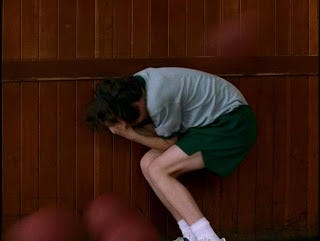
The Geeks story is also filled with well-observed moments I, for one, could definitely relate to. When Cindy the cheerleader brings Sam his jacket, the Geeks all assume she must be in love with him, a misguided illogical jump that every man on this planet has made at least once in their lives. I wouldn’t say the epic Dodgeball set-piece is an experience I’m familiar with, but I know many others even slightly older than me are, and even then, the gym teacher is practically a dead ringer for my high school coach (and how awesome that Mr. Fredericks is played by Biff Tannen himself, Tom Wilson?). The resolution to the Geeks’ story introduced the show’s tendency to give the characters small victories, rather than large ones, reflecting a fundamental truth about teenage life. Neal and Bill get roughed up fighting Alan, but they at least managed to fluster and humiliate him, and though Cindy rejects Sam’s date proposal, Sam can be proud for at least working up the courage to ask her out, and she even promises to save a dance for him. I love the moment when Sam, Neal, and Bill all reunite; none of their plans have gone quite right, but graded on the sharp curve that is their lives, they can all be at least reasonably proud of their accomplishments.

Lindsay and Sam’s stories intersect in two key scenes that demonstrate the full power of the pilot: in the first, Lindsay storms off to her room after being scolded by her parents for ditching, and Sam comes in to talk. She casually reassures him about fighting Alan – perhaps the nicest thing she does for Sam in the early episodes – and at Sam’s prompting, explains why it is she’s “throwing her life away.” Lindsay was the only one with her Grandmother when she died, and her last words, about seeing nothing after death, deeply shook Lindsay. As Lindsay explains to Sam, “she was a good person all her life, and that’s what she got: nothing.” This is another fine example of both Cardellini’s incredible acting talents and the show’s ability to get dark and serious and mean every word of it. It’s also a very powerful scene that allows us to sympathize with Lindsay at all times from this point forward; no matter how bad some her decisions might be in the future, we know where she’s coming from, and we can understand, if not condone, the things she does.

Their second intersecting scene is the final sequence of the episode, set at the Homecoming dance and brilliant scored to “Come Sail Away.” It’s one of the happiest endings the show would ever do, but given how much Sam and Lindsay struggle to get to that moment where they can momentarily throw their cares away dancing, it’s entirely earned, and more importantly, hammers home how much emotional investment we have in these characters after just one episode. The smile I wore watching Sam bravely ask Cindy for a dance hurt my jaw rather intensely, and was matched every bit by seeing Lindsay finally be happy as she set things right by Eli and dances with him.
What an absolutely perfect end to one of the best pilots in TV history. The only other Network pilots I can think of that got me this invested in the characters this fast would be Lost and Firefly, but both of those had the benefit of two hour premieres, and neither exist in a layer of reality this close to our own. Lindsay and Sam definitely walk away the most strongly defined in the pilot, but Feig and company would waste no time in the next few episodes making us care for characters like Bill, Daniel, Kim, and Nick just as intensely.
OTHER THOUGHTS:
--To demonstrate how far much of the Freaks and Geeks team went in their careers, I’ll highlight some of the crew here each week: in this case, the pilot was written by the show’s creator, Paul Feig, who has since become a very successful TV comedy director, helming numerous episodes of “The Office,” “Arrested Development,” “Nurse Jackie,” and others, and most significantly, directed last summer’s smash-hit-best-Comedy-of-2011, “Bridemaids.” The pilot was directed by Jake Kasdan, who has directed a number of comedy films in the 2000s, including a personal favorite of mine, “Walk Hard: The Dewey Cox Story.”
--Harold Weir, Lindsay and Sam’s dad, delivers the most reliably funny running gag of the episode: insisting that every type of bad behavior will inevitably lead to death, complete with examples. Even this gag, though, eventually takes a dark turn as it triggers a very emotional outburst from Lindsay.
--Mr. Kowchevsky, the teacher who scolds Alan and then tells Sam to “be a man,” continues to be a tremendous dick in future episodes.
--One thing that doesn’t work in the pilot is Neal’s constant barrage of pop-culture references. It’s supposed to establish both the period setting and where the Geek’s obsessions lie, but I think that could have been done with a subtler hand. Luckily, Neal backs off constantly comparing things to Star Wars staring in the next episode, so all is well.
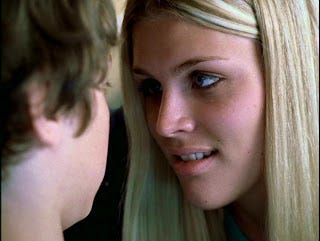
--Kim Kelly is probably the scariest character in the pilot; where Alan is all talk, Kim is a much more viable bully, and her tormenting of Sam in the hallway is basically psychological torture. Kim will be fleshed out beautifully in the show’s historic fourth episode.
--Speaking of that sequence, John Francis Daley, who plays Sam, was a fantastic young actor, wasn’t he? He only gets more impressive in future episodes, but he doesn’t come across as precocious or fake as most actors his age do, and he’s especially good portraying Sam’s wide range of emotions as Kim torments him.
That’s all for now. I promise future reviews won’t be this long, for the most part, but if any show deserves the extra length, it’s Freaks and Geeks.
NEXT WEEK:
Episode Two, “Beers and Weirs,” which is, if you can believe it, even better than the pilot.

